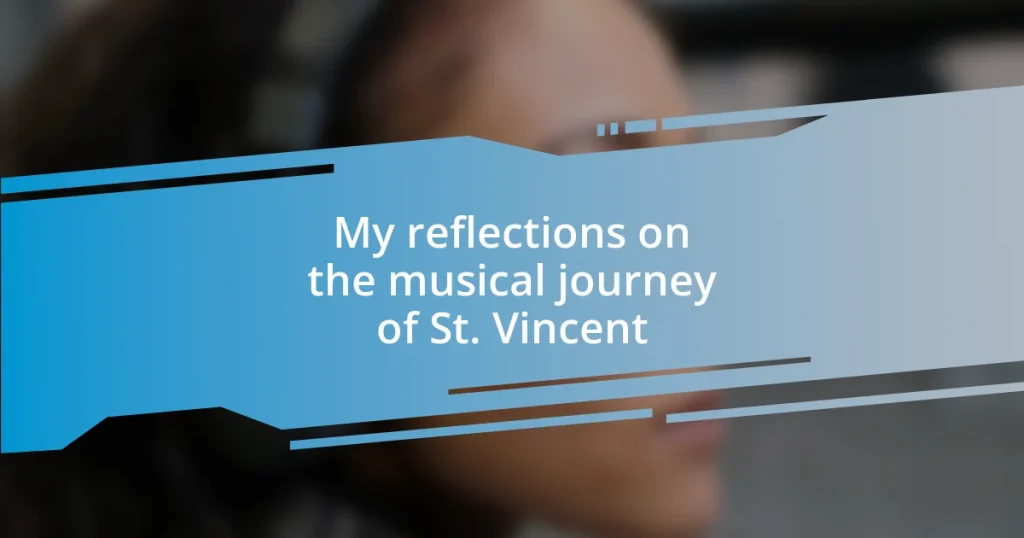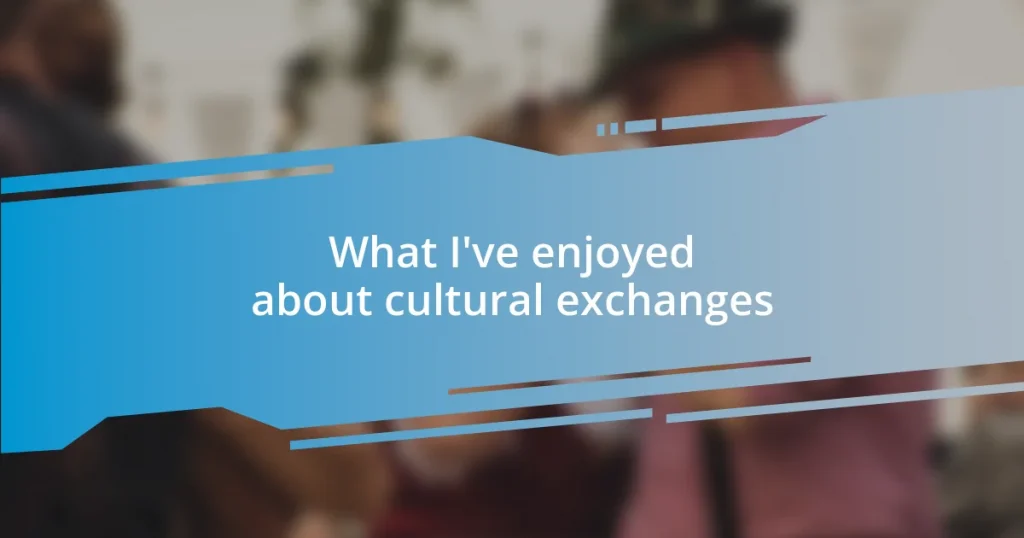Key takeaways:
- St. Vincent, or Annie Clark, blends rock, pop, and avant-garde sounds, utilizing emotional storytelling and intricate musical arrangements that resonate deeply with listeners.
- Her musical evolution is marked by key albums such as *Marry Me*, *Strange Mercy*, and *Masseduction*, each reflecting her personal growth and artistic experimentation.
- St. Vincent’s impact on contemporary music includes challenging genre boundaries, incorporating theatrical performances, and addressing societal issues, inspiring others to engage deeply with their artistry.

Introduction to St. Vincent’s Music
St. Vincent, known as Annie Clark to her friends, captivates listeners with her eclectic blend of rock, pop, and avant-garde sounds. When I first heard her album Strange Mercy, I was struck by her ability to combine raw emotional honesty with intricate musical arrangements. Have you noticed how her unique guitar work feels almost like a conversation with the lyrics?
Her music stands out not only for its technical prowess but also for its profound storytelling. Each song seems to dip into the complexities of relationships and personal identity, creating a relatable tapestry of human experience. I remember getting lost in “Digital Witness” and reflecting on how the lyrics mirrored my own feelings about technology and isolation—how often do we process these feelings through art?
With each album, St. Vincent reinvents herself while maintaining that signature blend of vulnerability and strength. It’s fascinating to see how her artistry has evolved over the years, yet her sound remains unmistakably hers. I often wonder, what is it about her music that resonates so deeply with us? Perhaps it’s her fearless exploration of the self that invites listeners to embark on their own journeys of self-discovery.

Early Life and Influences
St. Vincent’s early life was deeply influenced by her family and surroundings. Growing up in Tulsa, Oklahoma, Annie Clark was exposed to music from a young age, particularly through her father’s love for diverse genres and her mother’s background as a music educator. I remember how my own upbringing shaped my tastes—music was always playing in my house, creating a rich environment for creativity and expression.
Attending a school for the arts strengthened her resolve to pursue music as a career. At just 12 years old, she taught herself to play the guitar, a pivotal moment that I find remarkable. It takes a special kind of determination to forge your path at such a young age. I often reflect on how those initial experiences can set the stage for the incredible artistry we later witness.
St. Vincent’s influences are varied and vibrant, drawing from the likes of David Bowie and Patti Smith to contemporary rock sounds. Reflecting on my own musical influences, I see how these early inspirations play a crucial role in shaping one’s unique sound. Just like St. Vincent, my initial connections with artists often unveiled layers of emotional depth and innovation that I wished to replicate in my own work.
| Influence | Impact on Music |
|---|---|
| Father’s Diverse Music Taste | Helped develop a rich musical foundation |
| Mother’s Music Education Experience | Encouraged early exploration of musicality |
| School for the Arts | Fostered talent and commitment to music |
| Influences like David Bowie | Inspired creativity and genre-blending |

Key Albums and Milestones
St. Vincent’s discography is marked by a series of key albums that not only showcase her evolving sound but also highlight significant milestones in her career. Each release is like a chapter in her personal story, reflecting where she was in her life. I still remember the first time I listened to Actor—it was like stepping into a dreamscape filled with haunting melodies and intricate arrangements. It made me realize how an album can truly encapsulate a moment in time for both the artist and the listener.
Here are some key albums and their milestones:
- Marry Me (2007): St. Vincent’s debut album, which introduced her distinct voice and style, garnering critical acclaim.
- Actor (2009): A significant leap in artistic expression, blending orchestral pop with her signature sound.
- Strange Mercy (2011): This album marks a peak in emotional honesty, showcasing themes of vulnerability and personal struggle.
- Love This Giant (2012): Collaborating with David Byrne, this project expanded her musical horizons, incorporating brass and eclectic rhythms.
- St. Vincent (2014): A self-titled album that reflected a transformative period in her life, embracing a more experimental and electronic edge.
- Masseduction (2017): A bold exploration of desire and heartbreak that resonated deeply with listeners, making it a defining moment in her career.
- Daddy’s Home (2021): A nostalgic reflection on her past, informed by the influences of 1970s glam rock, further pushing her creative boundaries.
These milestones are markers of not just artistic growth, but also personal evolution. Each time I revisit her albums, I find new layers that reflect my own experiences, evoking emotions I didn’t realize were there. It’s as if St. Vincent has a unique ability to translate her internal landscape into music that allows us to reflect on our own lives.

Evolution of Musical Style
St. Vincent’s musical style has evolved remarkably, shifting from the intricate indie-pop of her early work to a bold blend of experimental sounds and sharp lyrical introspection. I remember how her self-titled album, St. Vincent, took me by surprise with its electronic influences and heavy beats. It felt like a striking departure, as though she was shedding old skins to reveal something bolder and more authentic. Isn’t it fascinating how artists can redefine themselves while still holding onto the essence of who they are?
As she continued to explore different sonic territories, St. Vincent incorporated a variety of genres, including art rock and even punk elements. This eclecticism resonates with me deeply because it mirrors my personal journey in music—experimenting with styles and finding my own voice. I often wonder, how does one decide when to take a risk in their artistry? For St. Vincent, it seems to be a gut feeling that guides her, allowing her to boldly step into new realms without losing her identity.
Her willingness to embrace vulnerability is also a hallmark of her evolving style. In albums like Masseduction, she delves into deeply personal themes such as desire and heartbreak with an honesty that is almost palpable. Reflecting on my own experiences, I can relate to that unfiltered exploration of feelings. It’s this depth of emotion that not only elevates her music but connects with listeners, reminding us that vulnerability can be a source of strength. Isn’t it remarkable how music can evoke such powerful emotions, bridging gaps between our experiences and those of the artist?

Themes in St. Vincent’s Lyrics
St. Vincent’s lyrics beautifully intertwine themes of identity and self-exploration. I often find myself captivated by her candid reflections on personal struggles and growth, particularly in songs like “New York.” There’s something deeply relatable about her exploration of feeling both lost and on the path to finding oneself. It prompts me to ask: how often do we grapple with our own identities, reflecting on who we once were versus who we aspire to be?
Another compelling theme in her work is the complexity of love and desire. In tracks like “Los Ageless,” she delves into the bittersweet nature of relationships, capturing that unique blend of yearning and disillusionment. I remember listening to this song during a late-night drive, feeling every word resonate with the tumult of my own experiences. It raises the question: can love ever be fully understood, or is it meant to be a series of paradoxes that we navigate like a maze?
Additionally, St. Vincent doesn’t shy away from addressing societal issues, adding layers of meaning to her lyrics. Songs like “Digital Witness” challenge our relationship with technology and its impact on authentic human connection. I can’t help but think about how social media often distorts our perceptions of reality. Have you ever felt overwhelmed by the digital world? St. Vincent’s ability to articulate these thoughts not only validates my own concerns but also ignites a deeper contemplation about the nature of our modern existence.

Impact on Contemporary Music
St. Vincent’s innovative approach has significantly influenced contemporary music, particularly in how artists perceive genre boundaries. I distinctly recall hearing her blend of rock with electronic elements for the first time, and it was like a light bulb moment for me. It raised a question: what if we let go of traditional constraints and simply let our musical ideas flow freely? This liberation is something I see many artists embracing now, feeling inspired by her fearlessness.
Her idiosyncratic sound and theatrical performances have also left an indelible mark on the live music scene. I remember attending a concert where her stage presence transformed the venue into a realm of immersive artistry. It made me think—how often do we allow visual creativity to enhance our musical experience? St. Vincent seems to answer this by turning performances into a complete sensory journey, encouraging other musicians to step beyond merely playing notes on a stage.
Moreover, her smart and incisive commentary on modern themes pushes fellow artists to confront societal issues through their music. I found myself reflecting on the lyrical depth in tracks like “Digital Witness” and recognizing how it prompted my own writing. Isn’t it empowering when music ignites a conversation about pressing matters? By addressing these contemporary themes, St. Vincent not only entertains but also challenges us to think critically, shaping the landscape of music with purpose and relevance.

Personal Reflections and Insights
Reflecting on St. Vincent’s musical journey, I can’t help but connect her work to my own experiences. I remember the first time I listened to “Actor Out of Work.” The way her lyrics dissect themes of vulnerability resonated with me deeply. It was a reminder that vulnerability isn’t a weakness; rather, it can be a powerful tool for self-discovery and artistic expression. Have you ever found a song that feels like it was written just for you during a pivotal moment in your life?
Her fearless exploration of diverse sounds also sparks a personal recollection. I’ve always been drawn to music that pushes boundaries, and St. Vincent’s artistry feels like a kaleidoscopic journey. I didn’t realize how much I craved sonic experimentation until I heard “Masseduction.” The fusion of layers in that album made me question my own musical taste. What does it say about me when I gravitate toward the unconventional, yet undeniably compelling?
Diving into her work often leaves me contemplating the nature of identity and authenticity in a world that frequently demands conformity. I recall times when I felt pressure to fit into certain molds, and her songs became anthems of resilience during those periods. When I listen to “Birth of the Cool,” I’m reminded that embracing one’s quirks is what makes us truly memorable. Could it be that our uniqueness is our greatest strength? St. Vincent’s journey encourages us to explore these questions, leading us to richer, more authentic lives.
















